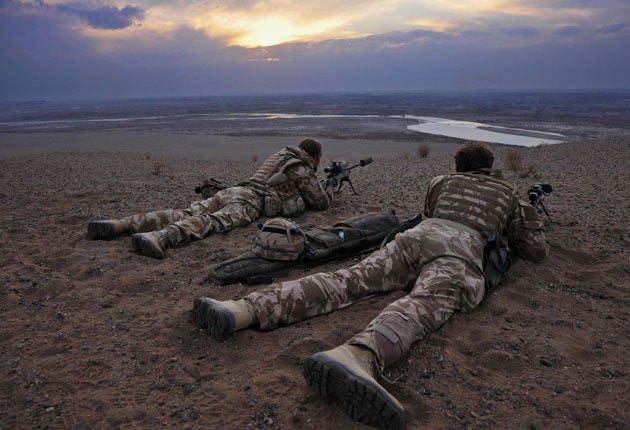Army to give soldiers more time off
Troops to have extra six months between tours of Iraq and Afghanistan

Your support helps us to tell the story
From reproductive rights to climate change to Big Tech, The Independent is on the ground when the story is developing. Whether it's investigating the financials of Elon Musk's pro-Trump PAC or producing our latest documentary, 'The A Word', which shines a light on the American women fighting for reproductive rights, we know how important it is to parse out the facts from the messaging.
At such a critical moment in US history, we need reporters on the ground. Your donation allows us to keep sending journalists to speak to both sides of the story.
The Independent is trusted by Americans across the entire political spectrum. And unlike many other quality news outlets, we choose not to lock Americans out of our reporting and analysis with paywalls. We believe quality journalism should be available to everyone, paid for by those who can afford it.
Your support makes all the difference.British soldiers serving in Iraq and Afghanistan are to be given an extra six months off between tours because the "relentless pace" of operations in both war zones is putting pressure on their marriages and family lives. The Army is "undermanned" and needs 3,500 more serving troops, its head, General Sir Richard Dannatt, also said.
General Dannatt, in a speech at the Institute for Public Policy Research in London, confirmed that British servicemen and women would have their time between overseas deployments rise from two years to 30 months, because the present system was "unacceptable".
He said: "Many families and marriages have unfortunately fallen victim to the relentless pace of operations. We have seriously stretched our soldiers, both their goodwill and [that of] their families. A gap of one year between operational deployment is not unusual, and often soldiers are spending much of the year before a deployment away from home in training and preparation. This is unacceptable."
General Dannatt, who retires as Chief of the General Staff this year, said he would reduce the amount of time soldiers spent overseas by creating fewer fighting brigades with more troops in each, to be deployed less often. There are 10 units, each with around 4,000 soldiers, but under the new system there will be only six.
He said: "The Army should be about 102,000 soldiers. It is about 98,500. By definition we are undermanned. There is a very strong argument for the size of our land forces to be larger."
The general also criticised the Government for delaying the production of a new generation of armoured vehicles, saying that soldiers' present forms of transport "harks back to the Sixties and Seventies". The Defence Secretary, John Hutton, who is visiting troops in Afghanistan's Helmand province, told BBC Radio 4's Today programme: "I agree with what the general has said and I think we have accepted that the strain of mounting two major operations – one in Iraq and one in Afghanistan – is creating very substantial strain and stress on our military forces."
Although insisting that it was "not a regular occurrence" for troops to be sent on an operational deployment after only a year's break, Mr Hutton acknowledged that the pressure on soldiers serving in small, specialist units was too high and should be addressed. He said the demand for serving troops would be relieved by the removal of some soldiers from Iraq this year.
But the shadow Defence Secretary, Liam Fox, described General Dannatt's comments as "yet more confirmation that overstretch is seriously damaging the Army's ability to do its job" and called for a review of the present strategy. He said: "The surest way to have unhappy service personnel is to have unhappy service families. General Dannatt's suggestions should be taken seriously, as he is at least attempting creative solutions for our overstretch problem.
"Reducing the number of overseas deployments is a start, but the Government must also look at issues of housing, health care and veterans' welfare if it wants to avert a serious crisis in recruitment and retention. Repairing the broken military covenant is long overdue."
Join our commenting forum
Join thought-provoking conversations, follow other Independent readers and see their replies
Comments